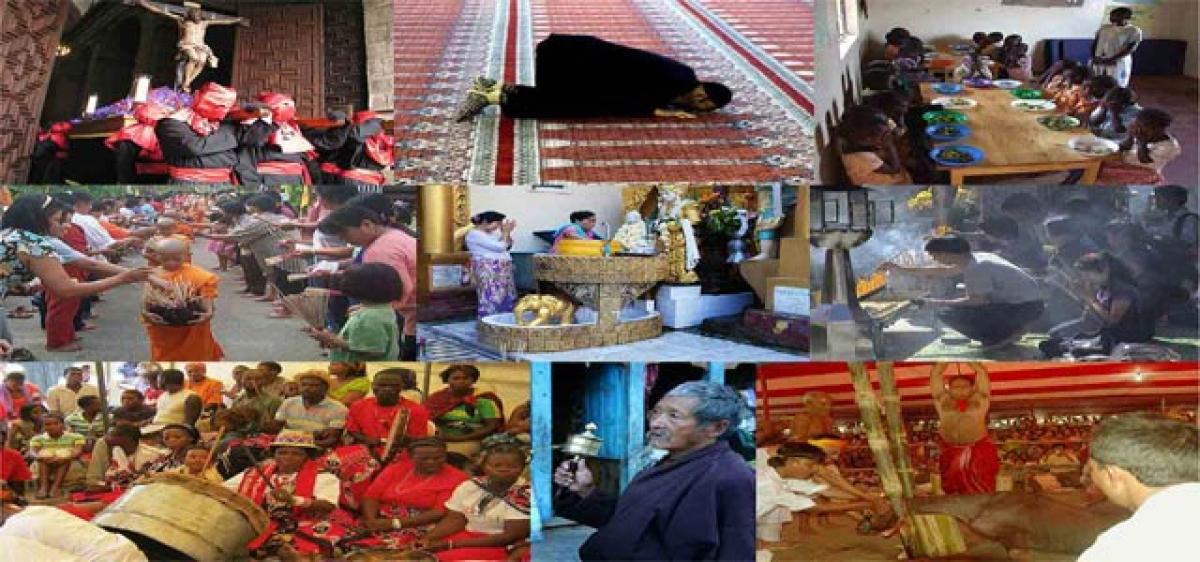Live
- Request to get UNESCO tag for Ahobilam Paruveta Utsavam
- India 6th largest mkt on MSCI IMI index
- SVIMS gets two Thalli-Bidda express vehicles
- Tax refunds surge 56% to over `2 lakh cr in FY25
- Markets welcome US rate cut
- India’s logistics cost will reduce to single-digit: Gadkari
- Why fear ONOE: Dr Laxman to Kharge
- Tirupati: Two women thieves arrested
- One Nation One Election a diversionary tactic of BJP: Cong
- Gau Dhwaj Bharat yatra set to begin from Sept 22
Just In

Marx had stated long back that religion is the opium of the masses. At that time, the observation was disputed by conservatives who found disrespect of the communist philosopher towards religion.
Marx had stated long back that religion is the opium of the masses. At that time, the observation was disputed by conservatives who found disrespect of the communist philosopher towards religion. According to them, religion was a belief that could guide them to a communitarian approach to living and establishment of a peaceful society.
Recent trends, however, in many parts of the world show that religion instead of ensuring bondage and societal peace has become the cause of hatred and jealousy. Very little spiritualism and respect for the supreme – which all religions aim at – is manifest nowadays.
On the other hand, fundamentalist religious leaders propagate ideas that are not in consonance to peaceful coexistence and instigate their supporters to ensure that the beliefs of other religions are not allowed to be followed. Narrow ideas of a selfish nature are manifest in the activities of these leaders, who cannot be considered to be preaching true religion and spiritualist attitude to life and society.
There is also a tendency of political leaders having vested interests in promoting religious heads so that the votes of the community are ensured in elections. This happens especially with the minority religious communities or backward castes who are enticed through their religious leaders to vote for a particular political party for reported gains to that particular religion. This type of dangerous trend has been manifest during the last two decades, especially in the Third World countries.
In the case of South Asia and particularly India, though the government calls it secular, it has a pro-Hindu bias. In Pakistan, the government is nakedly pro-Muslim with the avowed objective of promoting religion not only in the country but also in the surrounding nations, if necessary, through force. Even in Bangladesh religion has taken a nasty trend with its leader’s hand-in-glove with some of their political counterparts.
A section of philosophers and thinkers are of the opinion that all persons born in India may be called ‘Hindus’ by birth though they may have other religious beliefs. In the Persian language, people who were living near the bank of Indus were ‘Sindhu’ or later ‘Hindus.’ Hinduism has been said to be a way of life and not a dogmatic religious belief. As in Islam, Christianity, Sikhism, there is no particular religious leader in Hinduism. The latter is an open book and anybody and everybody can become its adherent.
Social scientists including the renowned scholar, Prof Samuel P. Huntington, had long observed that the ultimate war in the world would be fought between Christians and Muslims. The prophecy has become quite relevant today as the western powers led by the US are up in arms against the Islamic countries in the Middle East and Pakistan is under fire for abetting terrorism. One needs to wonder whether Islam or the way Islam is propagated is not conducive to a healthy and peaceful society.
Religion doesn’t give the dignity to women that they deserve, and their status and position is always below of the men. The present trends the world over clearly manifest that religion has not become a unifying force. Most of the young generation in India and other neighbouring countries have not felt the impact of spiritual values on their life, mainly due to the negative role of religious teachers.
Mahatma Gandhi was one of the few political leaders who invoked religion in politics to make the latter transparent, clean and wedded to the truth. He like Vivekananda accepted all religions and tried to unify the masses based on spiritual principles. Gandhi himself stated: “My religion is for God; therefore it is for humanity”. And, “anything done in his name, any work dedicated to him is sacred if done with the spirit of welfare of mankind, the uplift of the creature as a whole”. A humane approach to life is the need of the day. Only then can the religious values impact our lives and bring harmony and peace in society.
By Oishee Mukherjee

© 2024 Hyderabad Media House Limited/The Hans India. All rights reserved. Powered by hocalwire.com







